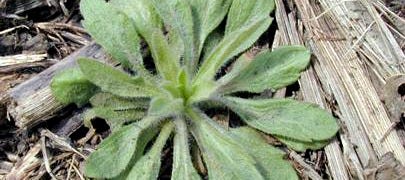August 12, 2014

While unpredictable weather may delay application timing of spring herbicides, more growers are adding a burndown application in the fall to their weed management program. Though the focus when applying a fall burndown is on control of winter annual weeds, a fall burndown provides numerous benefits for soil health and pest management.
A fall burndown application will provide control of winter annual weeds, like marestail, that usually germinate in the fall. Applying herbicides to these weeds in the fall, at the beginning of their growing season, will provide more efficient control than if a herbicide application is put on hold for the spring – targeting fully established weeds.
Flexibility

CONTROL MEASURES: Applying herbicides to fall weeds at the beginning of their growing season will provide more efficient control than if a herbicide application is put on hold for the spring.
Applying a burndown in the fall helps to provide flexibility in the spring. Often, spring weather can be unpredictable, and there are fewer days for optimal herbicide application in spring than in fall.
“Over the the last two years, many growers have faced a compressed spring because of cold and wet weather, resulting in less time to apply a preplant or burndown herbicide before planting,” said Mark Oostlander, Technical Market Manager, BASF. “A burndown application applied in the fall, when there are more suitable days for fieldwork, provides certainty that an application can be completed.”
Temperature control
A recent study conducted by Kevin Bradley, University of Missouri weed specialist, found that fall burndown applications also result in increased soil temperature. The study found that spring soil temperatures increased by as much as 5 degrees in corn and 8 degrees in soybeans when a residual fall herbicide was applied.
“Controlling winter annual weeds with a fall burndown can also result in greater soil moisture when it comes time for planting,” said Bradley. “With those weeds eliminated, the competition for moisture and other nutrients is also eliminated.”
Pest control
Winter annual weeds can also serve as hosts for other pests that might overwinter in crop fields. Pests like soybean cyst nematode and black cutworm are easier to control in the fall by eliminating winter weeds.
Source: BASF
You May Also Like




